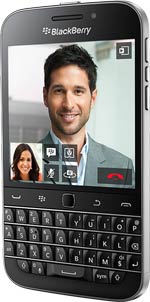As BlackBerry brings to market its new Classic, I think it is interesting to look back and review what the firm has accomplished. BlackBerry represents one of the most interesting turnarounds because, like Apple in the late 1990s, the firm had been almost given up for dead. It took someone with a passion for the products and who knew where the firm needed to go. It isn’t an easy path and it is far from done, but I think the progress is impressive.
Focus Back on the Enterprise
Ironically, this doesn’t always work. I think focus on the enterprise is what killed Netscape and badly damaged Microsoft, but this is because they started out more focused on consumers and the pivot then took them too far away from the user, who was the basis for their success. But with BlackBerry, its initial success was a business focus, and on a back-end system that would meet the needs of an IT manager. Its problems resulted from losing track of the user and then chasing Apple to get them back; that clearly didn’t end well.

BlackBerry moved its market-leading mobile management program, BlackBerry 10, to multi-platform so it could compete more successfully. Other offerings that were released include BBM Meetings, a conferencing product, VPN Authentication by BlackBerry, which allows you to use your phone like a token, WorkLife, which separates personal activity from work on the phone, and perhaps the most powerful, BlackBerry Blend, which allows you to move your communications and content intact from your BlackBerry to your PC or tablet, seamlessly.
Took Ford from Microsoft
SYNC is one of Ford’s leading differentiators. St CES, it indicated that SYNC alone is responsible for between 10 percent and 20 percent of new car sales. SYNC was initially a partnership with Microsoft, negotiated by Bill Gates personally, but just this last month, Ford announced that it was switching to BlackBerry. QNX is the dominant platform on the operating side of cars, the part that actually gets the car to go and stop, but QNX wasn’t that well known as an infotainment offering. Replacing Microsoft at Ford wasn’t trivial, given how much Ford relies on its Ford SYCN offering, and since car companies typically think in terms of decades, Ford wouldn’t have made this switch if it had any doubts about BlackBerry. I think this win alone says a lot about how far the firm has come this year.
I doubt Microsoft let this go easily, given the personal involvement of Gates, who remains the firm’s chairman.
Brought on Board Leading Talent
Part of the success for any turnaround is access to talent. BlackBerry has been successful in getting a number of top players. These include John Sims, who was president of SAP’s Mobile services and came to SAP by way of 724 Solutions, TANTAU Software, Intrado and Tandem Computers, and now leads BlackBerry’s Global Enterprise Services, Dr. Chennakeshu, who had been president of Ericsson’s mobile platforms and CTO at Sony-Ericsson, a fellow of IEEE and inventor of 73 patents, and Mike Daniels, who joined the BlackBerry board after being the CEO of Mobile 365 and has an equally powerful history.
If you can’t attract and retain good people, you can’t do a turnaround. Chen has been doing reasonably well getting the right folks on his team.
Wrapping Up: Recreating BlackBerry
I think that 2014 has largely been about stabilizing the firm and assuring its future. Given that, some impressive offerings have been released this year. As the pressure drops off the company’s need to survive, it will be able to think more about where the market can go, step back into a leadership role, and feel more free to make even more interesting bets. Much like we never could have anticipated Apple transitioning from a PC company to a consumer electronics company, I don’t think we can yet see where BlackBerry will end up. I expect, as it was with Apple, in five years it will be very different, but the fact that it will still be around at that time is likely the biggest accomplishment this year. Last year, that outcome wasn’t so sure.
John Chen and BlackBerry kicked a little butt this year. Next year, I’m expecting them to do even more interesting things.
Rob Enderle is President and Principal Analyst of the Enderle Group, a forward-looking emerging technology advisory firm. With over 30 years’ experience in emerging technologies, he has provided regional and global companies with guidance in how to better target customer needs; create new business opportunities; anticipate technology changes; select vendors and products; and present their products in the best possible light. Rob covers the technology industry broadly. Before founding the Enderle Group, Rob was the Senior Research Fellow for Forrester Research and the Giga Information Group, and held senior positions at IBM and ROLM. Follow Rob on Twitter @enderle, on Facebook and on Google+



